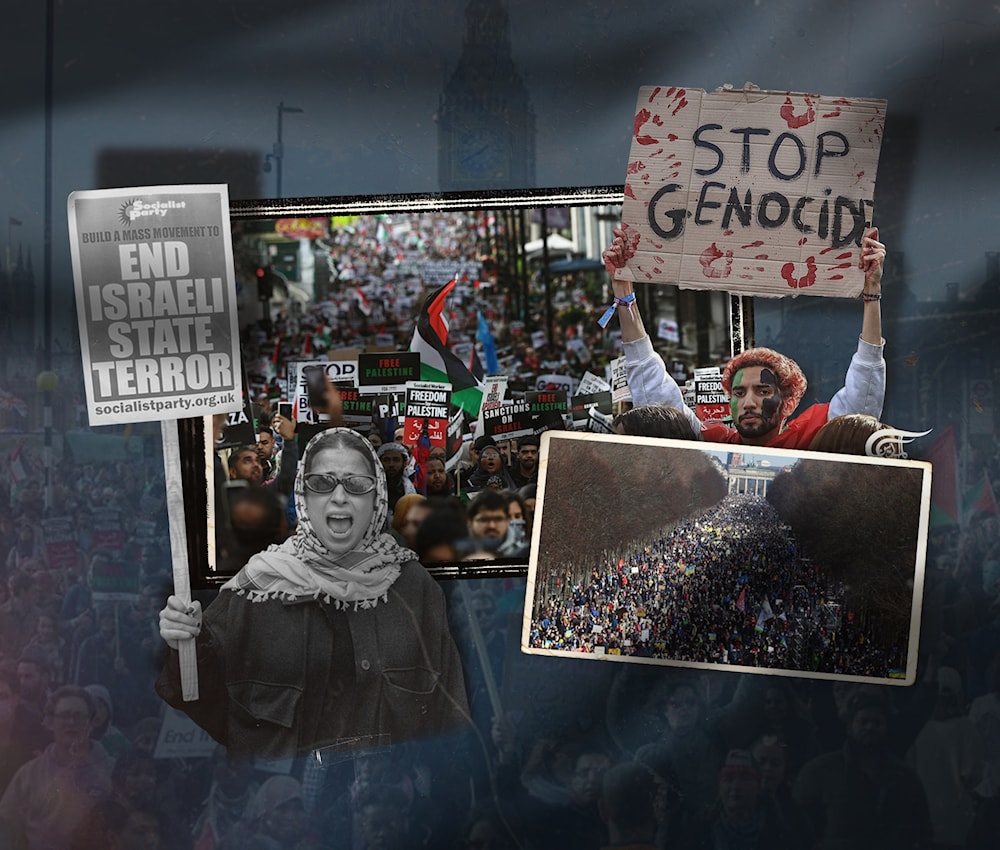Whither the European anti-war movements?
Some believe that the peace movement would only grow stronger, particularly in the Global South, and a lot has also happened in the North since the war against Gaza.
-

Is the peace movement in a 'deplorable state' or on the rise?
War has been going on across Ukraine for two years, in the East of the country for even ten years. "Israel" is reducing large parts of the Gaza Strip to rubble, storming hospitals, and occupying schools in their ongoing genocide. In the past, tens of thousands marched in Europe against imperialist aggressions. However, this time, no peace movement has developed in Austria and Germany – a search for clues with those who want to change that.
At the end of October, a few hundred activists from around the world met in Rome, Italy. What they have in common: They want an end to the war in Ukraine because, according to the title of the conference, it has the potential to escalate into a Third World War.
In the final declaration of the conference “Stop World War 3: International Initiative for Peace,” delegates from 40 organizations and individuals from 25 countries called for “NATO defeat in Ukraine.” The aggressive policy of the West brought about the war that “did not begin on February 24th, 2022," for it began “much earlier, with the expansion of NATO into Eastern Europe. The dirty wars in Yugoslavia, the collapse of the once most vigorous Balkan state, and the provocation of wars in the Caucasus were all stages of the same project. The war against Russia had already begun immediately after the illegal dissolution of the USSR, which was enforced against the will of its citizens," the Rome declaration reads. To ensure that this situation does not lead to an even larger conflagration, it was decided to “form a permanent coordination network." A follow-up conference is scheduled to take place at the end of 2024.
International media had little interest in the meeting in Rome, although even Slovakia’s former head of government, Ján Čarnogurský, stopped by. RT and Press TV were the only ones who attended and reported the event.
For Willhelm Langthaler, it was still a success. He tells Al Mayadeen English over coffee in Austria’s capital, Vienna, “We tried to get out of the left-wing bubble, and we partially succeeded.” Langthaler has been active in the anti-war movement for decades and has organized many similar conferences.
He comments that the peace movement is in a “deplorable state”. Millions demonstrated against NATO in the 1980s and the Iraq invasion in 2003, Langthaler remembers. He recognizes three main reasons for the decline of the peace movement: First, the integration of the political left in Europe into the “Western, globalist regime,” as he calls the transatlantic axis led by the US. Secondly, the “US empire is in decline," and there is a tendency toward world war. The left “subordinated itself to the Western narrative” in this historical situation, he explains to me. Thirdly, there was a “left-wing liberalization of the Western regime." In the resulting culture war, the Western left would have assimilated itself culturally to neoliberalism.
The crisis in the small peace movement is exacerbated by its division: A first peace conference took place in Vienna, Austria, in June 2023. While the participants in Rome were not among the organizers of the Vienna conference, the June organizers did not appear in Rome in October: The conference call and the final declaration of the Vienna conference would solely blame Russia and do not mention NATO’s responsibility, Langthaler says, explaining division among the movement.
One of the Vienna organizers was Leo Gabriel. He has been on the International Council of World Social Forums for decades. The organizers of the Rome conference would have “an eye on a political victory for the progressive forces” and would “take sides". His approach is different: “Peace involves a different logic. It means creating a platform on which negotiations can take place.” The left would often rely on the victory of one side and thereby ignore the prospect of peace, he tells me, a few days after I meet with Langthaler.
Nevertheless, he contradicts my claim that the peace movement is in crisis: “It is getting stronger and stronger,” says Gabriel. It would grow strong, particularly in the Global South, and a lot has also happened in the North since the war against Gaza. The largest peace demonstrations since 2003 occurred in London. “Austria is a lame country regarding movements.” Germany is different because the Peace Bureau in Berlin organized the Vienna conference. Additionally, in February and November 2023, significant peace demonstrations with tens of thousands of participants took place under the patronage of Sahra Wagenknecht and Alice Schwarzer.
Sevim Dagdelen was involved in the organization of the peace demonstrations in Berlin, the capital of Germany. “There is a great deal of rejection among the population to the (German) federal government’s current escalation course,” says the Bundestag (Parliament) member from North Rhine-Westphalia in an interview for Al Mayadeen. She is pleased that 900,000 people have signed the “Manifesto for Peace” by Wagenknecht and Schwarzer. The manifesto calls for a stop to arms shipments to Ukraine, for an immediate ceasefire, and a negotiated solution to the conflict.
However, many leftist activists did not participate in the rally. “The failure of the party Die Linke (The Left) leadership on the peace issue is inexcusable." The chairperson of the party and the Berlin state chairwoman, Katina Schubert, join in with the warmongers of the Greens and the Liberal FDP with their demands for arms shipments or (the Thuringian Prime Minister) Bodo Ramelow, who supports arms shipments (to Ukraine) against Russia‚ to any extent necessary. “Such stances are a heavy burden for cooperation with the peace movement,” explains Dagdelen. The party Die Linke has “arrived in the NATO camp,” she emphasizes.
That was one reason why Dagdelen split from Die Linke party in October and set up a new party with Wagenknecht under the name Buendniss Sahra Wagenknecht (BSW) in January 2024. “The Sahra Wagenknecht Alliance, BSW, advocates for a ceasefire and negotiated solution to the Ukraine war and the conflict in Palestine,” she says, adding, “Arms shipments are not a solution, but part of the problem.”
Franz Soelkner also wants support from politicians. He is a Styrian Peace Platform member and has organized several Graz demonstrations since October 7. On November 4, 1,500 participants came, an impressive number for the Styrian capital. However, as is often the case, “no one from the Communist Party, KPOe, which governs the city, her party, then so much would be possible,” he says over the phone.
Yet, the KPOe, a recognized force in past antiwar and peace movements in Central Europe, stays out of the mobilizations this time. Long-time activist Karl Reitter also had to experience this. When he wrote an article about the peace movement and the Ukrainian war, it was rejected by the party magazine Volksstimme, in whose editorial team Reitter was. He gave a copy of the text to Al Mayadeen. “I argued that something like the demonstration in Berlin in February 2023 should also be organized in Austria,” says Reitter when I met him in his Viennese apartment. It should not be about who you demonstrate with but “what you demonstrate for."
The text was not printed – one reason he resigned from the Volksstimme editorial team and ultimately from the party in spring 2023. The party’s reaction is an expression of the fact that political activists would no longer analyze in the categories of oppressors and oppressed, but rather “attitude and identity became the central category,” Reitter describes, adding, “The left was caught up in the swamp of defending the Corona and Ukraine.” He, therefore, describes them as the “fair weather left."
“When the social pressure is there, the party and the activists duck away and stay silent.”
The journalist and publisher Hannes Hofbauer has been observing the departure of the left and the KPOe party from the peace movement for some time. The Ukraine war is not the first “where the KPOe behaved incorrectly." He can remember that even during the NATO bombing of Serbia, some in the party refused to take to the streets against the imperialist aggression. “Due to the reorientation of the KPOe in recent years, it is no longer clear that they are against war,” Hofbauer believes.
He also believes a new movement against war can only emerge with other actors because there is opposition to the war in Ukraine and Palestine among the population in Europe. Today, new groups, especially young people with a migrant background and those who no longer feel represented by the parties are taking to the streets. Everyone I spoke to emphasized the situation. On the other hand, the historical European left would have given up: together with the former anti-war party Greens, it has arrived in the political mainstream, defending imperialism and neoliberalism.

 Dieter Reinisch
Dieter Reinisch
 8 Min Read
8 Min Read











